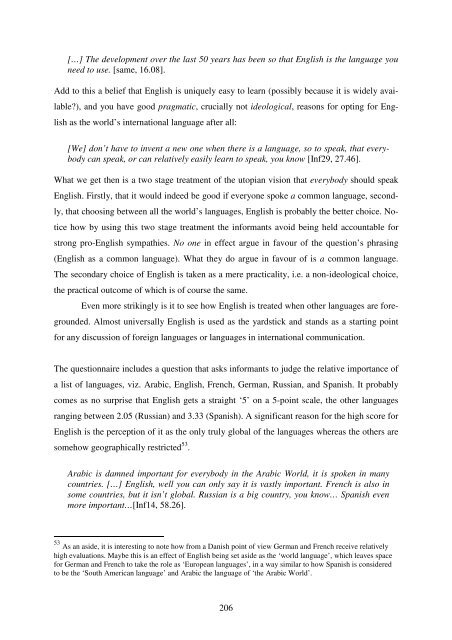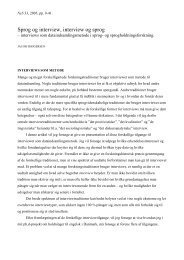Hør dog hvad de siger - Note-to-Self: Trials & Errors
Hør dog hvad de siger - Note-to-Self: Trials & Errors
Hør dog hvad de siger - Note-to-Self: Trials & Errors
You also want an ePaper? Increase the reach of your titles
YUMPU automatically turns print PDFs into web optimized ePapers that Google loves.
[…] The <strong>de</strong>velopment over the last 50 years has been so that English is the language you<br />
need <strong>to</strong> use. [same, 16.08].<br />
Add <strong>to</strong> this a belief that English is uniquely easy <strong>to</strong> learn (possibly because it is wi<strong>de</strong>ly avai-<br />
lable?), and you have good pragmatic, crucially not i<strong>de</strong>ological, reasons for opting for Eng-<br />
lish as the world’s international language after all:<br />
[We] don’t have <strong>to</strong> invent a new one when there is a language, so <strong>to</strong> speak, that everybody<br />
can speak, or can relatively easily learn <strong>to</strong> speak, you know [Inf29, 27.46].<br />
What we get then is a two stage treatment of the u<strong>to</strong>pian vision that everybody should speak<br />
English. Firstly, that it would in<strong>de</strong>ed be good if everyone spoke a common language, second-<br />
ly, that choosing between all the world’s languages, English is probably the better choice. No-<br />
tice how by using this two stage treatment the informants avoid being held accountable for<br />
strong pro-English sympathies. No one in effect argue in favour of the question’s phrasing<br />
(English as a common language). What they do argue in favour of is a common language.<br />
The secondary choice of English is taken as a mere practicality, i.e. a non-i<strong>de</strong>ological choice,<br />
the practical outcome of which is of course the same.<br />
Even more strikingly is it <strong>to</strong> see how English is treated when other languages are fore-<br />
groun<strong>de</strong>d. Almost universally English is used as the yardstick and stands as a starting point<br />
for any discussion of foreign languages or languages in international communication.<br />
The questionnaire inclu<strong>de</strong>s a question that asks informants <strong>to</strong> judge the relative importance of<br />
a list of languages, viz. Arabic, English, French, German, Russian, and Spanish. It probably<br />
comes as no surprise that English gets a straight ‘5’ on a 5-point scale, the other languages<br />
ranging between 2.05 (Russian) and 3.33 (Spanish). A significant reason for the high score for<br />
English is the perception of it as the only truly global of the languages whereas the others are<br />
somehow geographically restricted 53 .<br />
Arabic is damned important for everybody in the Arabic World, it is spoken in many<br />
countries. […] English, well you can only say it is vastly important. French is also in<br />
some countries, but it isn’t global. Russian is a big country, you know… Spanish even<br />
more important…[Inf14, 58.26].<br />
53 As an asi<strong>de</strong>, it is interesting <strong>to</strong> note how from a Danish point of view German and French receive relatively<br />
high evaluations. Maybe this is an effect of English being set asi<strong>de</strong> as the ‘world language’, which leaves space<br />
for German and French <strong>to</strong> take the role as ‘European languages’, in a way similar <strong>to</strong> how Spanish is consi<strong>de</strong>red<br />
<strong>to</strong> be the ‘South American language’ and Arabic the language of ‘the Arabic World’.<br />
206



